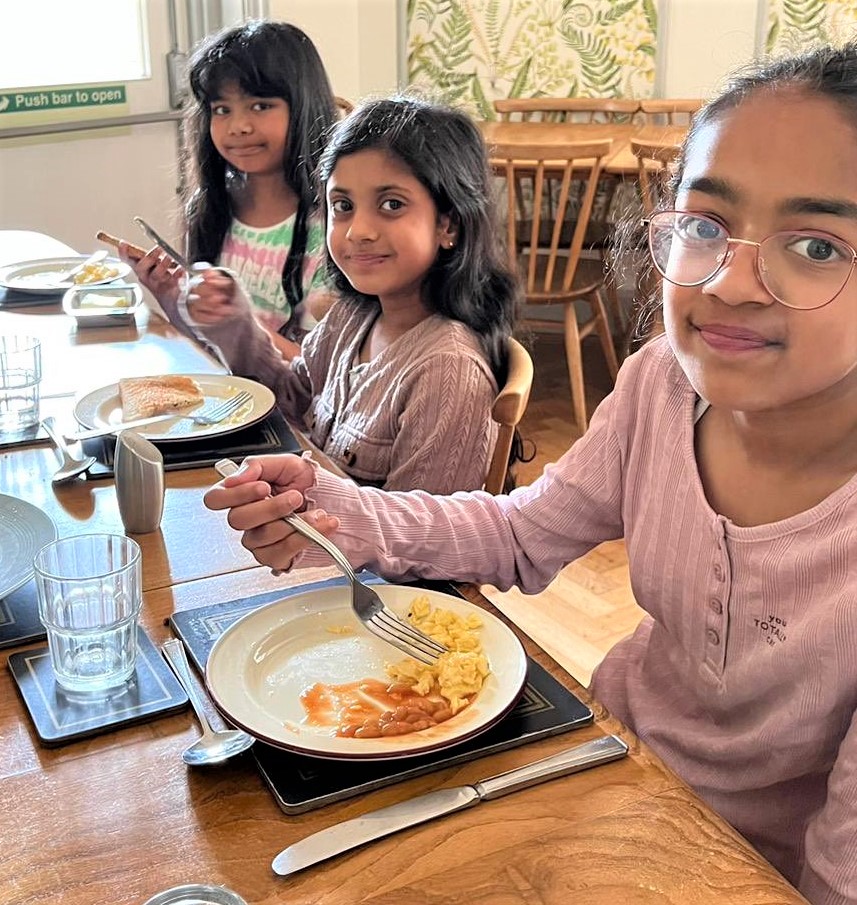PHILOSOPHY FOR CHILDREN (P4C) AT BANGABANDHU
Article 12 : You have the right to be listened to and taken seriously
Philosophy for Children at Bangabandhu is a whole school approach with every child from Nursery to Year 6 taking part in regular P4C sessions. Our aim, through P4C sessions, is for all our children to enhance their thinking and communication skills, boost their self-esteem, and improve their academic attainment. We want our children to become articulate speakers and develop the ability to justify answers, arguments and opinions. We teach the importance of participating collaboratively in discussion by maintaining attention, staying on topic and initiating and responding to others' comments and opinions thoughtfully.

It is through well-structured P4C sessions that children will be provided with the opportunity to consider and evaluate different viewpoints, and develop their skills of oracy, questioning, critical thinking and reflection. Children are taught the importance of contributing to the smooth running of an enquiry and the need for rules and democratic procedures to facilitate this.
How we do it
As a Rights Respecting School, our lessons are grounded on the UN Convention of the rights of the child. P4C lessons focus on key themes that are prevalent in our local and global community such as Homelessness, Equality and Fair Trade. Using these themes, carefully designed lessons are created to facilitate a rich and fruitful discussion within our classrooms. In our weekly P4C sessions at Bangabandhu, a stimulus, such as a story, video clip or image, is shared with the class. The children are encouraged by the teacher, in role as a facilitator, to come up with big, engaging philosophical questions about the stimulus which are at the heart of P4C. Typically, these sessions last for 30 minutes or can be continued over two weeks, and follow a structure which is varied by the class teacher according to the age group of the class.
Philosophical questions are open to examination, further questioning and enquiry. They are contestable, central and common – that is, there is more than one valid point of view, the question is important in the lives of the children, and it is a shared issue or concern.
Some philosophical questions that children have come up with:
Is it ever OK to lie?
What makes you who you are?
Do we have to respect everyone?
Can good people do bad things?
Do animals have the same rights as humans?
What will happen at the end of the world?
Through a vote, the children then choose the question they would most like to discuss. The teacher gives the children time to think and reason individually about the question before facilitating the exchange of ideas and opinions as a group, or community for enquiry. Children are encouraged to use a range of sentence stems when contributing their opinions and thoughts, to help build upon each other’s ideas respectfully. The teacher supports the children to think more deeply and philosophically through carefully designed activities and open-ended questioning.
The 4 Cs of P4C
Through P4C lessons children will develop the 4Cs of philosophical thinking: creative, critical, caring and collaborative skills.
Caring thinking – listening (concentrating) and valuing (appreciating)
Collaborative thinking – responding (communicating) and supporting (building on each other’s ideas)
Critical thinking – questioning (interrogating) and reasoning (evaluating)
Creative Thinking – connecting (relating) and suggesting (speculating)
P4C in the Early Years Foundation Stage
P4C specifically promotes the British values of democracy and mutual respect for and tolerance of those with different faiths and beliefs and for those without faith. The children learn practically about democracy through P4C as almost every session involves the class voting on which question, they would most like to discuss. The weekly sessions enable children to develop their self-knowledge, self-esteem and self-confidence whilst encouraging respect for other people.
P4C also supports our children’s development by allowing them the opportunity to investigate and offer reasoned views about moral and ethical issues; by providing them with a space to develop their tolerance and respect for others’ feelings and values; and by promoting a sense of enjoyment and fascination in learning about themselves, others and the world around them.
In Early years, P4C sessions are less formal and are often in direct response to issues that may arise in the school setting, such as friendships, kindness or sharing. The children are introduced to a stimulus, which may relate to a known story or a game. From this, the children are encouraged to ‘wonder ’about the stimulus and develop their understanding of the concepts within the stimulus. From here, the class teacher will guide the children through a discussion, encouraging children to think about ‘big ’questions as well as ‘little ’questions.
Why we do it?
Through regular P4C sessions at Bangabandhu, the children’s questions have become more philosophical and imaginative. Children have learnt to listen carefully to each other, to explore differences of opinion respectfully, and to value the ideas of others. Our children are empathetic, calm and reasonable, dealing with life’s complexities with sensitivity and emotional intelligence.
P4C is also being used outside of its dedicated time, in other subject areas, which has proven to be quite fruitful. As children understand the procedures and rules of the session, it allows valuable and meaningful discussion to take place. All teachers have received training on how to deliver successful P4C sessions, and the results speak for themselves.
